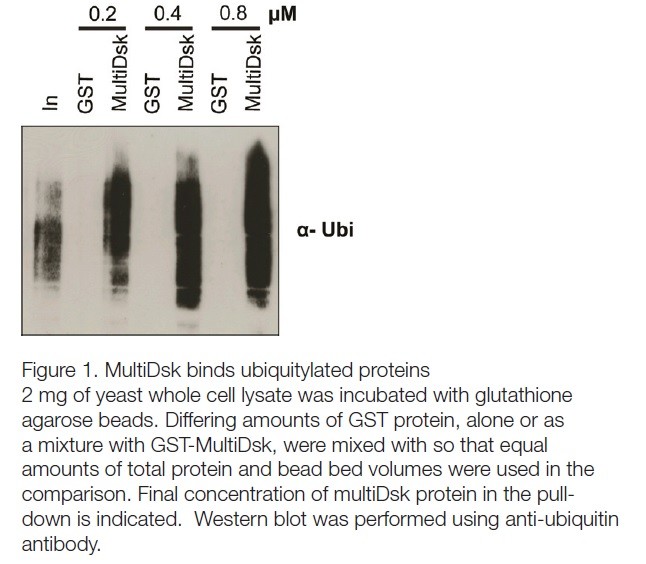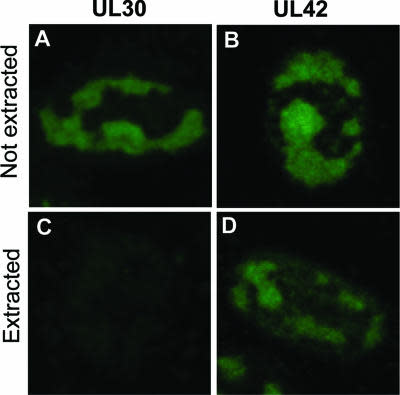Cat. #151830
MultiDsk Vector
Cat. #: 151830
Availability: 3-4 weeks
Target: MultiDsk, Ubiquitin
This fee is applicable only for non-profit organisations. If you are a for-profit organisation or a researcher working on commercially-sponsored academic research, you will need to contact our licensing team for a commercial use license.
Contributor
Inventor: Jesper Svejstrup
Institute: Cancer Research UK, London Research Institute: Clare Hall Laboratories
Tool Details
*FOR RESEARCH USE ONLY (for other uses, please contact the licensing team)
- Tool name: MultiDsk Vector
- Research fields: Cell signaling and signal transduction;Genetics
- Description: Ubiquitylation is a highly diverse and complex post-translational modification for the regulation of protein function and stability. Studies of ubiquitylation have, however, been hampered by its rapid reversal in cell extracts, for example through the action of de-ubiquitylating enzymes (DUBs). MultiDsk is a novel ubiquitin-binding protein reagent and is composed of an array of five UBA domains from the yeast ubiquitin-binding protein Dsk2, fused to GST. MultiDsk binds ubiquitylated substrates with unprecedented avidity, and can be used as both an affinity resin to study protein ubiquitylation, and to effectively protect ubiquitylated proteins from the action of DUBs and the proteasome in crude cell extracts. MultiDsk offers the opportunity to obtain pure, native, nontagged, ubiquitylated proteins from cell extracts whilst helping ensure the maintenance of the normal ubiquitylation state via a strong protective function, inhibiting de-ubiquitylation.
Handling
- Storage conditions: -80° C
- Shipping conditions: Dry Ice
Target Details
- Target: MultiDsk, Ubiquitin
Application Details
- Application notes: This novel high-affinity ubiquitin-binding protein reagent binds with higher affinity than any other ubiquitin-binding reagents we have tested. MultiDsk can be used to selectively enrich native ubiquitylated proteins and to protect these from the action of DUBs. The resin can also be used to efficiently purify both mono and poly-ubiquitylated proteins. MultiDsk can be used to identify novel ubiquitylated species. MultiDsk provides a significant protective role at concentrations as low as 0.2 μM, making it suitable for use in even large-scale extract experiments, especially because large quantities of the protein can easily be produced in E. coli.
References
- Emmerich et al. 2015. Biochem Biophys Res Commun. :. PMID: 26325464.
- Optimising methods for the preservation, capture and identification of ubiquitin chains and ubiquitylated proteins by immunoblotting.
- Wilson et al. 2013. Cell. 154(5):983-95. PMID: 23993092.
- Proteasome-mediated processing of Def1, a critical step in the cellular response to transcription stress.
- MultiDsk: a ubiquitin-specific affinity resin.
- Wilson et al. 2012. PLoS One. 7(10):e46398. PMID: 23056298.


![Anti-CAR Whitlow Linker [1C3C3]](https://cancertools.org/wp-content/uploads/Figure-6-Kimble-et-al.-J-Immunother-Cancer-2025-300x322.jpg 300w, https://cancertools.org/wp-content/uploads/Figure-6-Kimble-et-al.-J-Immunother-Cancer-2025-280x300.jpg 280w, https://cancertools.org/wp-content/uploads/Figure-6-Kimble-et-al.-J-Immunother-Cancer-2025-954x1024.jpg 954w, https://cancertools.org/wp-content/uploads/Figure-6-Kimble-et-al.-J-Immunother-Cancer-2025-768x824.jpg 768w, https://cancertools.org/wp-content/uploads/Figure-6-Kimble-et-al.-J-Immunother-Cancer-2025.jpg 1193w)

![Anti-CAR Whitlow Linker [1B4A1]](https://cancertools.org/wp-content/uploads/Figure-5-Kimble-et-al.-J-Immunother-Cancer-2025-300x396.jpg 300w, https://cancertools.org/wp-content/uploads/Figure-5-Kimble-et-al.-J-Immunother-Cancer-2025-227x300.jpg 227w, https://cancertools.org/wp-content/uploads/Figure-5-Kimble-et-al.-J-Immunother-Cancer-2025-776x1024.jpg 776w, https://cancertools.org/wp-content/uploads/Figure-5-Kimble-et-al.-J-Immunother-Cancer-2025-768x1013.jpg 768w, https://cancertools.org/wp-content/uploads/Figure-5-Kimble-et-al.-J-Immunother-Cancer-2025.jpg 970w)


